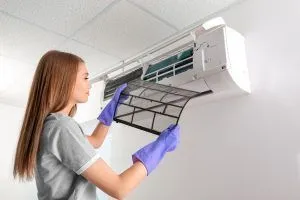
Different HVAC systems have different requirements, but, in general, changing your air filter every 90 days (or three months) is a good rule of thumb. Filters help sift dirt, dust, and bacteria out of the air flowing through your HVAC system so it is not blown around inside your home for you to breathe in. It also keeps those particles from damaging your HVAC system.
If you have questions about your HVAC filter, problems changing the filter, or you believe your central air conditioner and/or furnace may need to be repaired, call Ambient Edge at 702-944-8838. We can answer your questions and be there in a flash for scheduled service if needed.
Facts About Filters
If you think there aren’t many interesting facts about HVAC filters, you’d be wrong!
Bigger Doesn’t Mean Better
To find the filter size recommended for your HVAC unit, you can look in your owner’s manual or look up the model online. Stick with the recommended size.
HVAC filters are rated using Minimum Efficiency Reporting Value (MERV) from one to 16. The higher the MERV rating, the less air flows through and the more particles get trapped.
If you purchase an HVAC filter with a MERV rating higher than what is recommended by the manufacturer, you can severely restrict the airflow in your system and burn it out. Do not stray from the recommended MERV value and stick with the correct size filter to ensure it fits safely and snugly.
Seasons Change
For the most part, both HVAC system and filter manufacturers recommend changing your filter about every three months. Depending on where you live, you can use the change of seasons as a reminder to change your furnace filter.
However, if you live in a place where temperatures and weather remain pretty constant year-round, it’s more helpful just to put a reminder in your calendar to change the filter.
Filter Types
While there are washable HVAC filters, they are much less common than disposable fiberglass or fabric-blend filters. If your HVAC filter has a label that says it’s disposable, you must throw it away at the end of its three-month life.
Attempting to wash, vacuum, or wipe the filter then use it again can damage the filter and make it less effective (or not effective at all). It can also damage your HVAC system.
You May Need to Change Your HVAC Filter More Often
Changing your HVAC filter every three months is not a hard and fast rule. There are circumstances in which you should change your filter more often.
How Often You Use Your HVAC System
If you live in an area where your HVAC system, particularly the furnace, gets lots of use, check the filter more frequently for dirt and dust levels. The more you use the system, the faster the filter gets dirty.
If You Have High MERV Filters
The higher the MERV rating of your filter, the more often it needs to be changed. The denser the weave on the filter, the more particles, dust, and dirt it will trap. That means it will get clogged more quickly than filters with a lower MERV rating.
If You Have Excessive Dust
If you find your home is excessively dusty, even after you’ve cleaned, it’s a sign your filter could be stopped up. Look at your HVAC filter and if it is covered in dust and grime, change out the filter.
If You Have Construction Dust
If you’re remodeling or having construction work done on your home, change the filter frequently as the air in your home is a lot dustier and filled with debris. Once the project is complete, keep a close eye on the filter. It may take some time to filter out much of the dust in your home and the filters may need more frequent changing.
If You Have Pets
Households with pets of any type will likely need to change HVAC filters more frequently. This helps prevent allergens like dander and bacteria from circulating through your home and clogging up the filter.
If You Have Allergies
HEPA filters and HVAC filters specially rated to help filter out allergens are great at improving your indoor air quality, but they may need to be changed more frequently. People with allergies (such as pollen or pet dander) should plan on changing even standard filters more often, as it helps keep the air in your home cleaner to breathe.
What Happens When You Don’t Change Your HVAC Filter
Whether you just forget to change your HVAC filter on a regular basis or don’t feel it is an important task, the consequences of not changing your filter can be severe.
Increased Utility Bills
If you enjoy paying more for your energy bills, do not change your HVAC filter! When your filter is dirty, the HVAC unit has to work a lot harder to heat or cool your home. That uses more energy and you’re paying for that energy.
You can decrease energy consumption by up to 15% by simply replacing your filter, according to the U.S. Department of Energy.
Uncomfortable Home
A clogged air filter means cool or heated air does not flow efficiently through your home. That means your home is hotter in summer and colder in winter. The result is you being less comfortable in your home.
Reduced Indoor Air Quality
Filthy, clogged air filters mean the air you’re breathing in is dirtier. Additionally, as more bacteria, dust, dirt, and allergens hit your stopped-up filter, they back up into your ductwork and coat the insides of the ducts. Not only does that further reduce your indoor air quality, but it can cause health, breathing, and allergy issues.
Broken-Down HVAC Unit
The more clogged your air filter, the harder your HVAC unit has to work. The harder it has to work, the sooner it will need repair or replacement.
Schedule Your HVAC Assessment Today
Whether you’re having trouble finding the correct HVAC filter, or your HVAC system is having heating or cooling issues, Ambient Edge can help. Call 702-944-8838 now. We offer 24-hour emergency service when it’s needed!



